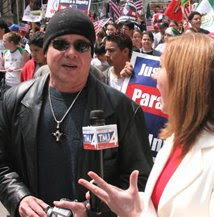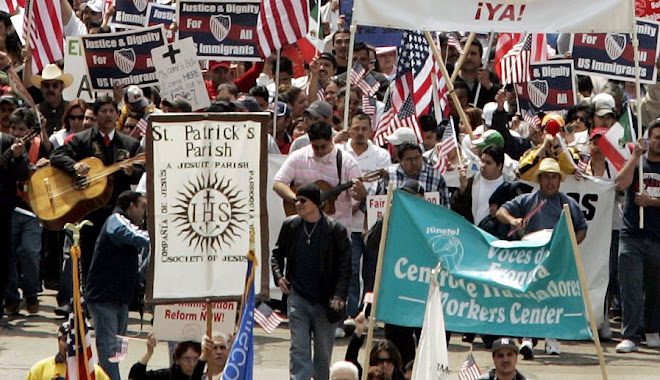President Hosni Mubarak
Pro-democracy protesters became outraged and waved shoes at Mubarak in Cairo's Tahrir Square during his speech.
By H. Nelson Goodson
February 10, 2011
Cairo, Egypt - On Thursday, in a forty-five minute speech Egyptian President Hosni Mubarak announced he won't step down, but handed power to his vice president during his address to the nation. Thousands of protesters became furious and began to chant "Down, down with Hosni Mubarak...leave, leave, leave...go,go, go" while waving shoes over their heads in Cairo's Tahrir or Liberation Square. Some protesters vowed to stay at Tahrir Square until Mubarak resigns.
The Muslim Brotherhood had feared the military could engage in a coup and stall transition to a democratic government. Protesters wanted the regime to dissolve and don't want the military to take over either.
Vice President Omar Suleiman will graduately take power, the regime stays intact and the government will take it, day by day, according to Mubarak's speech. Mubarak will stay as president and told the nation he was dissolving the upper levels of government effective immediately while transfering limited executive powers to Suleiman. Mubarak stood firm and said he won't give in to outside pressure to resign. He decided not to run for re-election after his term expires.
During the day, Army Major General Hassan Roweny and Egypt's Army Chief of Staff General Sami Eman had assured protesters at Liberation Square that their demands would come true and asked for tranquility as power shifts to democracy rule. The crowds earlier became jubilant and began to whisle, chant and clap in anticipation that Mubarak would resign and the regime would fall.
President Barack H. Obama says, America will do everything possible to help in Egypt's smooth and orderly transition of government.
On Thursday, most of the work force in Cairo stopped working and joined the ten of thousands of people at Tahrir Square. The Suez Canal was also shut down as laborers left their jobs.
During the 17 weeks of protests, labor union strikes were called, food shortages resulted, business shops closed down, the daily life was disrupted and economic growth stalled throughout Egypt. The average wage earner makes between $100 to $500 U.S. per month and in other jobs even less.
Connected by MOTOBLUR™ on T-Mobile
Pro-democracy protesters became outraged and waved shoes at Mubarak in Cairo's Tahrir Square during his speech.
By H. Nelson Goodson
February 10, 2011
Cairo, Egypt - On Thursday, in a forty-five minute speech Egyptian President Hosni Mubarak announced he won't step down, but handed power to his vice president during his address to the nation. Thousands of protesters became furious and began to chant "Down, down with Hosni Mubarak...leave, leave, leave...go,go, go" while waving shoes over their heads in Cairo's Tahrir or Liberation Square. Some protesters vowed to stay at Tahrir Square until Mubarak resigns.
The Muslim Brotherhood had feared the military could engage in a coup and stall transition to a democratic government. Protesters wanted the regime to dissolve and don't want the military to take over either.
Vice President Omar Suleiman will graduately take power, the regime stays intact and the government will take it, day by day, according to Mubarak's speech. Mubarak will stay as president and told the nation he was dissolving the upper levels of government effective immediately while transfering limited executive powers to Suleiman. Mubarak stood firm and said he won't give in to outside pressure to resign. He decided not to run for re-election after his term expires.
During the day, Army Major General Hassan Roweny and Egypt's Army Chief of Staff General Sami Eman had assured protesters at Liberation Square that their demands would come true and asked for tranquility as power shifts to democracy rule. The crowds earlier became jubilant and began to whisle, chant and clap in anticipation that Mubarak would resign and the regime would fall.
President Barack H. Obama says, America will do everything possible to help in Egypt's smooth and orderly transition of government.
On Thursday, most of the work force in Cairo stopped working and joined the ten of thousands of people at Tahrir Square. The Suez Canal was also shut down as laborers left their jobs.
During the 17 weeks of protests, labor union strikes were called, food shortages resulted, business shops closed down, the daily life was disrupted and economic growth stalled throughout Egypt. The average wage earner makes between $100 to $500 U.S. per month and in other jobs even less.
Connected by MOTOBLUR™ on T-Mobile






No comments:
Post a Comment